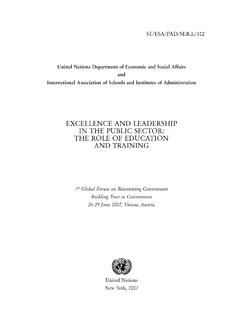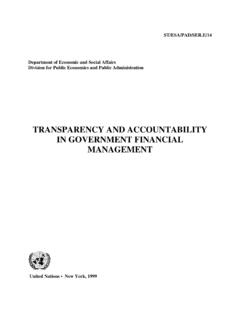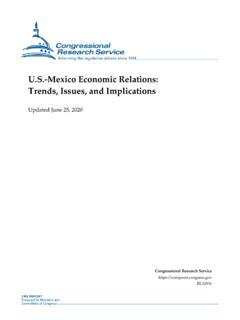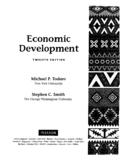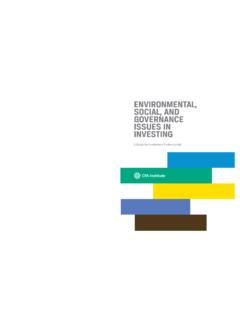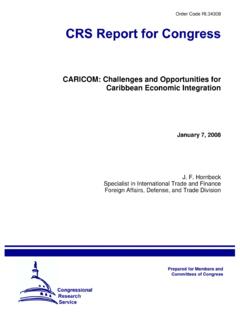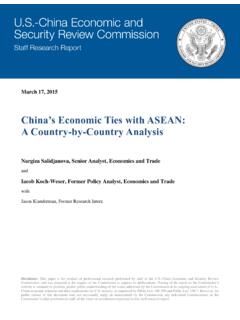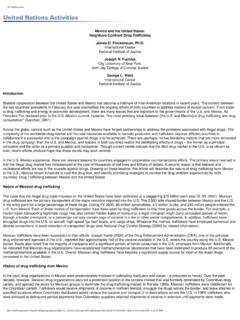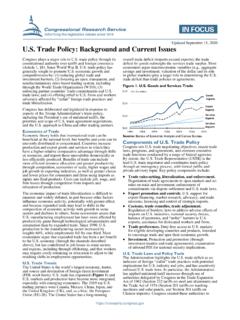Transcription of Human Resources for Effective Public Administration in a ...
1 ST/ESA/ United Nations Department of Economic and Social Affairs Division for Public Administration and Development Management HHuummaann RReessoouurrcceess ffoorr EEffffeeccttiivvee PPuubblliicc AAddmmiinniissttrraattiioonn iinn aa GGlloobbaalliizzeedd WWoorrlldd United Nations, 2005 ii Notes The designations employed and the presentation of the material in this publication do not imply the expression of any opinion whatsoever on the part of the Secretariat of the United Nations concerning the legal status of any country , territory, city or area, or of its authorities, or concerning the delimitation of its frontiers or boundaries. The designations developed and developing economies are intended for statistical convenience and do not necessarily imply a judgement about the stage reached by a particular country or area in the development process. The term country as used in the text of this publication also refers, as appropriate, to territories or areas.
2 The term dollar normally refers to the United States dollar ($) The views expressed are those of the individual authors and do not imply any expression of opinion on the part of the United Nations. Enquiries concerning this publication may be directed to: Mr. Guido Bertucci Director Division for Pubic Administration and Development Management Department of Economic and Social Affairs United Nations, New York, NY 10017, USA Fax: (212) 963-9681 iii MISSION STATEMENT The Department of Economic and Social Affairs of the United Nations Secretariat is a vital interface between global policies in the economic, social and environmental spheres and national action. The Department works in three main interlinked areas: (i) it compiles, generates and analyses a wide range of economic, social and environmental data and information on which Member States of the United Nations draw to review common problems and to take stock of policy options; (ii) it facilitates the negotiations of Member States in many intergovernmental bodies on joint courses of action to address ongoing or emerging global challenges; and (iii) it advises interested Governments on the ways and means of translating policy frameworks developed in United Nations conferences and summits into programmes at the country level and, through technical assistance, helps build national capacities.
3 Iv FOREWORD Developing an Effective , competent and forward looking Public service as well as strong but lean State institutions is one of the greatest challenges nations around the world face today. It is particularly crucial in developing countries as good governance is one of the most important factors, if not the most important factor, for the success of any development effort. The Millennium Declaration and other United Nations conferences have highlighted the central role of Effective governance in increasing the access of services to all citizens, enforcing Human rights legislation, enhancing the participation of women in the development process, protecting the quality of the environment and facilitating economic growth. How the Public sector is structured, how it operates and the role it performs within a country plays an important part in economic and social progress.
4 In particular, the quality of government leadership has a great impact on the quality of governance, which in turn affects the level of development of a region. Reforming Public sector in both developed and developing countries is not an easy task and many are the difficulties to be overcome. In the past twenty years a number of national and international forces have contributed to significantly changing the role of the state, which has resulted in the need for new skills, attitudes and behaviours among Public officials at all levels. In fact, the core competencies for the Public sector of the 21st century differ in many ways from the past, especially as the demands placed on Public servants, in terms of skills, knowledge and competency, are rapidly increasing and becoming more complex. Top government leaders in developing countries are still facing old challenges, while at the same time they also have to address new ones, which have resulted from the many social, economic and political changes sweeping throughout the world.
5 The increasing complexity of both policy-making and administrative processes, as well as the erosion of Human Resources capacity to carry out those functions, is making it difficult for many Member States to implement national goals and strategies to reduce poverty and to promote sustainable Human development, as emphasized in the Millennium Development Goals (MDGs). In view of the above, the United Nations Committee of Experts in Public Administration (UNCEPA) stressed at its First Meeting in 2002 that the challenge of good governance involves capacity-building through people and institutions. Through their knowledge, know-how and skills, people are at the heart of the performance of the state since it is people who provide services, promote innovations and carry out reforms. At its Second Meeting in April 2003, the Committee emphasized that Human Resources capacity is critical to the quality of Public Administration and at its Third Meeting in April 2004 it recommended that Member States should adopt a holistic national strategy to strengthen the management of Human capital in the Public sector.
6 In doing so, they should revisit core values and principles as outlined in national civil service legislation and charters, examine the coherence of their Human Resources management institutional framework, review recruitment and promotion strategies and incentives, institutionalize workforce planning, and ensure the representation of marginalized social groups. v In light of the above, and with a view to exploring some of the mentioned challenges, an Ad Hoc Expert Group Meeting on Unlocking the Human Potential for Public Sector Performance was organized in May 2004 by the United Nations Department of Economic and Social Affairs (UNDESA) in collaboration with the European University Institute located in Florence, Italy. The Meeting greatly benefited from synergies drawn from cooperation with the International Personnel Management Association IPMA-HR which organized its 29th International Symposium on Public Personnel Management in Florence, Italy from 9 to 13 May 2004.
7 The overall objective of the Expert Group Meeting was to provide a platform for senior government officials and experts to present and discuss the role of Human capital in revitalizing Public Administration at the national level, with particular focus on developing countries and transition economies. About 25 world-wide experts took part in this event and participated in constructive knowledge sharing. The purpose of this publication is to provide a concise overview of the main themes and challenges addressed during the meeting and to outline some of the messages which have resulted from two days of intense discussions. Thus, this publication explores and analyzes key emerging issues concerning Human Resources in the Public sector with a particular emphasis on developing countries. Each of the authors, writing in their personal capacity, outlines the critical role that Effective Human Resources in the Public sector plays in enhancing the quality of a democracy.
8 Ultimately, the ability of government to provide services effectively and efficiently depends upon a competent cadre of civil servants. Good government requires good people. In view of the above, the report is divided into three parts. Part One is devoted to the changing role of the state and the need for more open, participatory and Effective governments whereas Part Two looks at leadership capacity development strategies in the Public service. Part Three highlights key challenges and trends in Human Resources management, including recruitment and selection of Public workers; diversity and Public sector performance, as well as the impact of HIV/AIDS on Public sector Human Resources in Africa. While we will not be able to cover in-depth all of the contributions that were made, I hope that this publication may raise new important questions on how Human Resources competencies, skills and practices in the Public sector can be improved to better serve the needs of citizens in the XXI century.
9 Guido Bertucci, Director Division for Public Administration and Development Management Department of Economic and Social Affairs United Nations vi ACKNOWLEDGMENTS This publication is the result of the Ad Hoc Expert Group Meeting on Unlocking the Human Potential for Public Sector Performance , which was held in Florence from 6 to 8 May 2004 and of the contributions made by the various authors of this report. The Meeting was attended by 25 world-wide known experts in Human Resources and elicited intense discussions and exchange of ideas on a very timely and relevant topic. The Meeting, which was organized under the leadership of Mr. Guido Bertucci, Director of the Division for Public Administration and Development Management, was hosted by the European University Institute (EUI) to which we wish to extend our gratitude for its support and collaboration. In particular, we wish to thank the President of the EUI, Mr.
10 Yves Meny, for his highly instructive opening remarks. The Meeting also benefited from the partnership with the International Public Management Association Human Resources . Special mention goes to its President Bob Lavigna; to its Executive Director Neil Reichenberg, and to Lynda Von Bargen, President Elect. This publication was prepared by the Division for Public Administration and Development Management of the United Nations Department of Economic and Social Affairs. Adriana Alberti is editor of the entire report and contributor. All the participants and speakers at the Meeting provided invaluable information, knowledge and ideas that are incorporated in this publication. We wish to thank the experts that took part in the Ad Hoc Expert Group Meeting, including: Dr. Luis F. Aguilar, General Director, Gerencia P blica , Mexico; Mr. Ahmed Abdullatif Al-Bahar, Assistant Under-Secretary for Civil Service Affairs, Bahrain; Ms.
